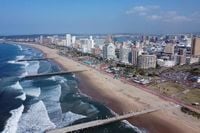As finance ministers and central bank governors from the world's largest economies gathered in Durban, South Africa, on July 17, 2025, the atmosphere was thick with tension and uncertainty. The Group of 20 (G20) summit, traditionally a forum for global economic cooperation, found itself overshadowed by escalating trade tensions fueled by U.S. President Donald Trump's aggressive tariff policies.
South Africa, hosting the summit under its presidency motto of "Solidarity, Equality, Sustainability," sought to steer the conversation toward pressing issues affecting the African continent. Topics such as the high cost of capital and the urgent need for funding climate change initiatives were front and center on the agenda. South Africa's Finance Minister, Enoch Godongwana, emphasized the critical role the G20 must play. "We have a critical role to play in revitalising and strengthening multilateralism by fostering inclusive dialogue, reinforcing rules-based cooperation and driving collective action in global challenges that no country can solve alone," he said. "The need for bold cooperative leadership has never been greater."
However, the summit's ability to deliver on these ambitions was clouded by the absence of key players and the growing fractures within the group. U.S. Treasury Secretary Scott Bessent was notably absent for the second time this year from a G20 event in South Africa, having also skipped the February meeting in Cape Town. Representing the U.S. instead was Michael Kaplan, the acting undersecretary for international affairs. While a G20 delegate who wished to remain anonymous acknowledged that Bessent's absence was "not ideal," they confirmed that the U.S. remained engaged in discussions concerning trade, the global economy, and climate language.
Adding to the diplomatic challenges, finance ministers from India, France, and Russia also missed the Durban meeting. South Africa's central bank governor, Lesetja Kganyago, underscored the importance of meaningful representation, stating, "What matters is, is there somebody with a mandate sitting behind the flag and are all countries represented with somebody sitting behind the flag?" This pragmatic view highlighted that while absences were unfortunate, the presence of empowered delegates was crucial for the summit's function.
The backdrop to these absences and uncertainties was President Trump's sweeping tariff policies, which have disrupted traditional global trade norms. Set to take effect on August 1, 2025, these measures include a baseline 10% tariff on all U.S. imports, with targeted rates soaring as high as 50% on steel and aluminum, 25% on automobiles, and looming levies on pharmaceuticals. More than 20 countries face the brunt of these tariffs, and the president's threat to impose an additional 10% tariff on BRICS nations—eight of which are G20 members—has stoked fears of fragmentation within the global economic order.
Germany's Bundesbank chief, Joachim Nagel, voiced grave concerns during the Durban summit. He warned that the central bank's modest growth forecast of 0.7% for Europe's largest economy in 2026 could be wiped out if Trump's threatened 30% tariffs materialize. "If tariffs materialise in August, a recession in Germany in 2025 cannot be ruled out," Nagel told Reuters. His comments underscored the tangible risks that protectionist policies pose not only to Germany but to the interconnected global economy.
Nagel also expressed unease about President Trump's public attacks on U.S. Federal Reserve Chair Jerome Powell, cautioning against any interference with the independence of central banks. This concern resonated widely among global financial leaders, who view central bank autonomy as a cornerstone of economic stability.
Looking ahead, the summit also focused on the transition of G20 leadership to the United States at the end of 2025. U.S. officials have indicated plans to streamline the summit schedule and reduce the number of non-financial working groups, signaling a potentially scaled-back approach to the G20 presidency. A source familiar with U.S. plans described the upcoming presidency as expected to be "kind of a scaled-back G-20 with less expectation of substantive outcomes," reflecting perhaps a more cautious or pragmatic stance amid turbulent global conditions.
Despite the challenges, South Africa's Treasury Director General Duncan Pieterse expressed hope that the Durban meetings would culminate in the issuance of the first communique under the South African G20 presidency. The G20 had last collectively issued a communique in July 2024, a document that called for resisting protectionism but notably refrained from mentioning Russia's invasion of Ukraine—a reflection of the delicate geopolitical tensions that continue to influence the forum.
As the finance chiefs convened in the coastal city of Durban, a drone view captured the serene beachfront juxtaposed against the high-stakes discussions unfolding inside. The meeting sought to deepen global relationships amid "turbulent times," as described by German Finance Ministry sources, yet the path forward remained uncertain.
The G20, born out of the global financial crisis of 2008, was designed to foster cooperation and coordinated policy responses. Yet, years of disputes, heightened by Russia's war in Ukraine and Western sanctions, have frayed the unity of this influential group. Now, with trade barriers rising and protectionism threatening to unravel decades of global economic integration, the G20 faces its sternest test in years.
South Africa's efforts to promote an African agenda highlight the need for inclusivity and attention to regions often sidelined in global economic policymaking. However, the summit's outcomes may be constrained by the non-binding nature of G20 agreements and the absence of key decision-makers.
In this complex and shifting landscape, the call from Durban is clear: the world needs strategic, cooperative leadership more than ever. Whether the G20 can rise to this challenge remains to be seen, but the stakes could not be higher.

